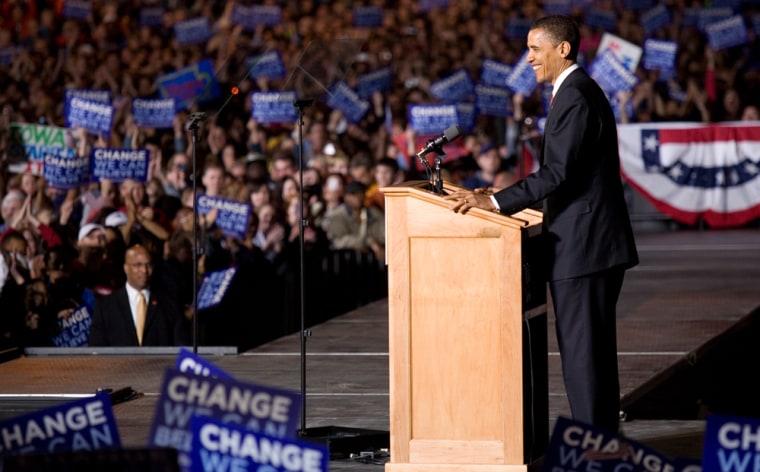As Sens. and split the Oregon and Kentucky primaries Tuesday night, Obama proclaimed that he had won “an absolute majority” of elected Democratic delegates and was “within reach” of the Democratic presidential nomination.
Obama, of Illinois, handily won in Oregon, while Clinton, of New York, coasted to victory in Kentucky. The results meant that Obama has won the largest share of the delegates elected in the long primary and caucus and season, according to NBC News’ tabulations.
In an e-mail message to supporters, he said, “We have won an absolute majority of all the delegates chosen by the people in this Democratic primary process.”
And in an address to supporters in Des Moines, Iowa — even before the first returns from Oregon were reported — he made it clear that he thought it was only a matter of time before Clinton was vanquished, declaring that “you have put us within reach of the Democratic nomination for president of the United States.”
Obama’s campaign touted the milestone as a big step toward ending the epic nomination battle.
“This is about delegates,” Sen. Amy Klobuchar, D-Minn., an Obama supporter, said in an interview with MSNBC’s Keith Olbermann. “I think it’s significant.”
But Clinton vowed to continue the fight through the last primaries in early June, “even in the face of some pretty tough odds.”
“This is one of the closest races for a party’s nominations in modern history,” in Louisville. “We’re winning the popular vote, and I’m more determined than ever to see that every vote is cast and every ballot is counted.”
Clinton now banking on superdelegatesClinton’s campaign chairman, Terry McAuliffe, insisted that undecided superdelegates — the party insiders who are not tied to primary or caucus results — would begin flocking to Clinton, saying they would conclude that she was the party’s best chance in the general election against Republican Sen. of Arizona.
In an interview with MSNBC’s Chris Matthews, McAuliffe referred to surveys of voters as they left their polling places which showed Clinton running most strongly among less-educated white voters, .
White voters without college educations have been a bulwark of Clinton’s coalition, and McAuliffe maintained that they would help her reclaim large industrial states like Ohio and Pennsylvania for the Democrats.
“We can win them back with Hillary Clinton at the top of the ticket,” he said.
Obama, however, made no bones about his intention to turn the focus of his campaign on McCain, dismissing him as a clone of President Bush on tax cuts, Iraq and health care.
“This year’s Republican primary was a contest to see which candidate could out-Bush the other, and that is the contest John McCain won,” he said.
Aides said the choice to make his primary-night speech in Iowa was a symbolic one: Obama’s victory in the first-in-the-nation Iowa caucuses last year catapulted the senator into the front ranks of Democratic contenders, and his return Tuesday night was meant to close the circle.
“From the very beginning, you knew that this journey wasn’t about me or any of the other candidates in this race,” Obama said.
“It’s about whether this country — at this defining moment — will continue down the same road that has failed us for so long or whether we will seize this opportunity to take a different path: to forge a different future for the country we love.”
On Wednesday, the Reuters/Zogby poll showed that the Illinois senator had opened an 8-point lead over McCain.
Obama also zeroes in on superdelegatesBut there is still the matter of finishing off Clinton.
After the Kentucky results, NBC News allocated 29 delegates to Clinton, with 18 going to Obama and eight still to be allocated. NBC projected that Obama held a 23-21 delegate split in Oregon, with eight remaining to be allocated.
Those totals give Obama 1,639 delegates in state primaries and caucuses, 12 more than the majority of 1,627.
Including superdelegates, Obama could be just 50 to 75 delegates short of the 2,026 needed for the nomination by Wednesday morning. That could help him persuade the 800 or so superdelegates who have not declared to pick up the pace of their endorsements.
Lisa Caputo, a prominent Clinton supporter, implicitly acknowledged the math Tuesday night, indicating in an interview on MSNBC that Clinton was soldiering on to benefit the party.
“Senator Clinton needs to stay in the race to make sure her supporters are galvanized to support the ticket whatever the ticket may be,” Caputo said.
Sen. Chris Dodd of Connecticut, who supports Obama, said he did not believe the contentious race would split the party.
“I’m very confident that Hillary Clinton will be as passionately for this campaign as she has been for herself,” Dodd said on MSNBC. “... You get in Denver [for the party’s national convention in late August] and you’re going watch one very, very excited party.”
‘Tool of organized labor’
Meanwhile, McCain hammered Obama on foreign policy, continuing a theme likely to persist into the general election that Obama is too naive to lead the United States.
Speaking to a raucous Miami crowd on Cuba’s independence day, he called Obama a “tool of organized labor” for opposing a Latin American trade deal and slammed him for saying he would meet with Cuban President Raul Castro.
Obama said in a debate last year that as president he would meet with the leaders of Cuba, Iran and Venezuela without conditions. McCain insisted that such meetings could endanger national security.
